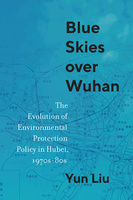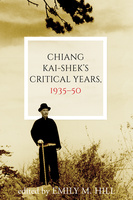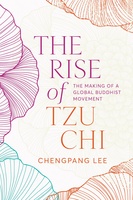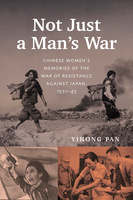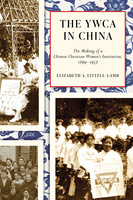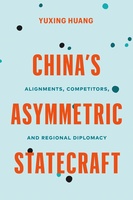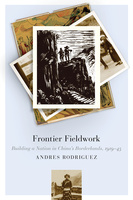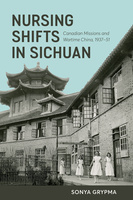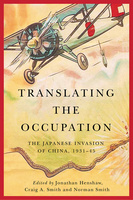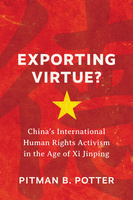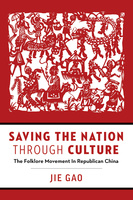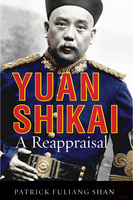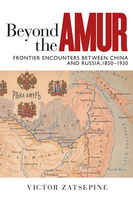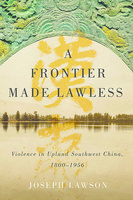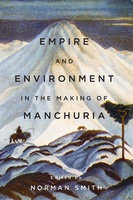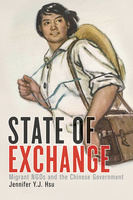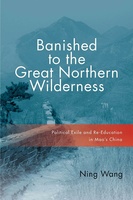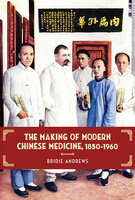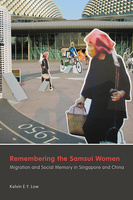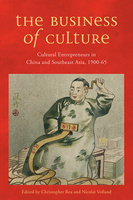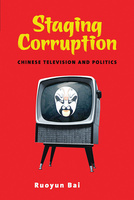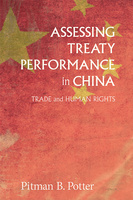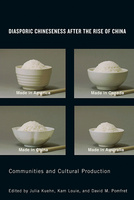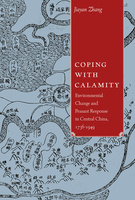Blue Skies over Wuhan
The Evolution of Environmental Protection Policy in Hubei, 1970s–80s
Blue Skies over Wuhan traces the development of environmental protection policy in China through a case study of Hubei Province, where an environmental agenda dominated by economic growth priorities gradually gave way to more mature, state-led governance.
Chiang Kai-shek's Critical Years, 1935–50
Chiang Kai-shek’s Critical Years analyzes an enigmatic figure at the peak of his influence, revealing an improvisational approach to political problems that brought remarkable successes alongside ultimate defeat.
The Rise of Tzu Chi
The Making of a Global Buddhist Movement
The Rise of Tzu Chi reveals a dynamic Asian religious movement that draws its global success from its capacity to incorporate diversity.
Not Just a Man’s War
Chinese Women’s Memories of the War of Resistance against Japan, 1931–45
Not Just a Man’s War uncovers the extraordinary stories of ordinary Chinese women during the horrific fourteen-year War of Resistance against Japan, from 1931 to 1945.
The YWCA in China
The Making of a Chinese Christian Women's Institution, 1899–1957
The YWCA in China traces the history of this Christian organization – and the social philosophies of the Chinese women who led it – through the tumultuous first half of the twentieth century.
China’s Asymmetric Statecraft
Alignments, Competitors, and Regional Diplomacy
China’s Asymmetric Statecraft uncovers the different narratives and paradigms that constitute Chinese foreign policy toward its weaker neighbours, alerting us to a dramatically changing international environment.
Frontier Fieldwork
Building a Nation in China’s Borderlands, 1919–45
Frontier Fieldwork exposes the transformative power that early-twentieth-century fieldwork had in placing the Sino-Tibetan borderlands at the centre of China’s nation-making process and race to modernity.
Nursing Shifts in Sichuan
Canadian Missions and Wartime China, 1937–1951
Nursing Shifts in Sichuan is a testament to the resilience of educated women, exploring modern nursing as one of the most consequential additions to health care in early-twentieth-century China.
Translating the Occupation
The Japanese Invasion of China, 1931–45
Featuring a collection of translated texts written by writers who lived through the occupation, Translating the Occupation challenges and deepens our understanding of the tensions and transformations that Japanese invasion wrought on Chinese society.
Exporting Virtue?
China’s International Human Rights Activism in the Age of Xi Jinping
Exporting Virtue? critically explores the ways in which China is attempting to change international human rights standards to accommodate its interests.
Saving the Nation through Culture
The Folklore Movement in Republican China
Saving the Nation through Culture tells the little-known story of how a group of Chinese scholars attempted to use “low culture” to promote national unity during a long period of crisis.
Yuan Shikai
A Reappraisal
This first major comprehensive study of Yuan Shikai in more than half a century explores the controversial life of one of the most important figures in China’s transition from empire to republic.
Beyond the Amur
Frontier Encounters between China and Russia, 1850–1930
Beyond the Amur charts the pivotal role that an overlooked frontier river region and its environment played in Qing China’s politics and Sino-Russian relations.
A Frontier Made Lawless
Violence in Upland Southwest China, 1800-1956
In the first Western language history of Liangshan, Joseph Lawson argues that the region was not inherently violent but made violent by turmoil elsewhere in China.
Empire and Environment in the Making of Manchuria
This unique analysis of Manchuria’s environmental history provides an overview of the climatic and imperialist forces that have shaped an area of ongoing geopolitical importance.
State of Exchange
Migrant NGOs and the Chinese Government
This exploration of the interactive relationship between Chinese NGOs and the Chinese state provides fresh insights into how the Chinese government operates and why it needs non-governmental organizations to survive.
Banished to the Great Northern Wilderness
Political Exile and Re-education in Mao’s China
Through newly accessed labour farm archives and recently uncovered Chinese-language sources, this book brings to life the experience of political exiles in Mao’s China.
The Stability Imperative
Human Rights and Law in China
Legal expert Sarah Biddulph uses case studies to examine the multiple and shifting ways in which the Chinese government’s efforts to maintain social and political stability impact on the legal definition and implementation of human rights in China.
The Making of Modern Chinese Medicine, 1850-1960
A history of the convergence of Western and Chinese medical practices in modern China.
The Pragmatic Dragon
China’s Grand Strategy and Boundary Settlements
Presenting a historical survey of China’s boundary disputes and settlements, Hyer demonstrates that its approach to territorial disputes has been pragmatic and strategic.
Remembering the Samsui Women
Migration and Social Memory in Singapore and China
A study of the Samsui women who migrated from China to Singapore, where they have been commemorated as nation-builders.
The Business of Culture
Cultural Entrepreneurs in China and Southeast Asia, 1900-65
The first critical analysis of Chinese “cultural entrepreneurs,” businesspeople whose entrepreneurial endeavours in China and Southeast Asia the late nineteenth and early twentieth centuries transformed the cultural sphere.
Staging Corruption
Chinese Television and Politics
A study of the television dramas about government corruption that became hugely popular in the mid-1990s and their reflection of China’s post-Socialist anxieties.
Assessing Treaty Performance in China
Trade and Human Rights
This volume examines the normative and operational dimensions of China’s legal performance related to international standards on trade and human rights.
Diasporic Chineseness after the Rise of China
Communities and Cultural Production
Leading international scholars examine the production of culture during China’s rise to global superpower in the last quarter of a century.
Cultivating Connections
The Making of Chinese Prairie Canada
The voices of Chinese immigrants who settled in the pre-1950s Canadian prairies come alive in this extraordinary record of migration, settlement, and community life.
Coping with Calamity
Environmental Change and Peasant Response in Central China, 1736-1949
The first environmental and socioeconomic history of the Jianghan plain in central China, focusing on the peasants’ relationship with a volatile environment.
Milestones on a Golden Road
Writing for Chinese Socialism, 1945-80
Milestones on a Golden Road examines works of fiction written in China between 1945 and 1980, when the arts were required to reflect a Maoist vision of history and society.
Chinese Comfort Women
Testimonies from Imperial Japan’s Sex Slaves
This is the first English-language book to record the experiences and testimonies of Chinese women abducted and detained as sex slaves in Japanese military “comfort stations” during Japan’s 1931-45 invasion of China.
Sporting Gender
Women Athletes and Celebrity-Making during China’s National Crisis, 1931-45
This book explores the casting of China’s earliest female Olympians as celebrities within the context of a national crisis, born of internal conflicts and external attack by Japan.
Red Stamps and Gold Stars
Fieldwork Dilemmas in Upland Socialist Asia
A multi-disciplinary volume reflecting on the fieldwork practices and dilemmas of researchers studying ethnic minorities in upland socialist Asia, specifically China, Vietnam, and Laos.
Principles of Chinese Medicine
Revised Edition
Acupuncture, Chinese herbs, qigong, tui na massage and diet therapy have been used by the Chinese for over 2000 years, and they are still the treatments of choice for millions of people throughout the East.
Chieftains into Ancestors
Imperial Expansion and Indigenous Society in Southwest China
An in-depth examination of how the Chinese imperial state impacted the social order of southwestern China’s minority peoples and redefined their histories and culture.
Principles of Kinesiology
Revised
Kinesiology is a system of natural health care which combines muscle testing with the principles of Chinese medicine to assess energy and body function.
Principles of Chinese Herbal Medicine
Revised Edition
Chinese herbal medicine has become an increasingly popular method of treatment for a range of different health conditions - from eczema to fertility problems. This book presents an authoritative introduction to the fundamentals of Chinese herbal medicine.
Merry Laughter and Angry Curses
The Shanghai Tabloid Press, 1897-1911
Merry Laughter and Angry Curses investigates the proliferation of late-Qing-era tabloid journalism and the tabloids’ role in subverting the political and intellectual establishment.
Tibet Wild
A Naturalist’s Journey on the Roof of the World
Follows Dr. George Schaller’s expeditions to the Tibetan Plateau from 1984 until the present day, including an inside look at Schaller’s current and possibly most ambitious project: the creation of the Pamir International Peace Park at the junction of Afghanistan, Pakistan, China, and Tajikistan.
Intoxicating Manchuria
Alcohol, Opium, and Culture in China's Northeast
Examines how alcohol, opium, and addiction were portrayed in the culture of China’s Northeast during the first half of the twentieth century.
A School in Every Village
Educational Reform in a Northeast China County, 1904-31
Engaging with topics central to scholarly debates on modern China, this book shows that China’s early twentieth-century school system, a product of negotiation and compromise, was more successful than previous scholarship has allowed.
Chasing the Dragon in Shanghai
Canada’s Early Relations with China, 1858-1952
Focusing on a century of Canadian initiatives in Shanghai, this book offers unprecedented insight into early Sino-Canadian relations.

